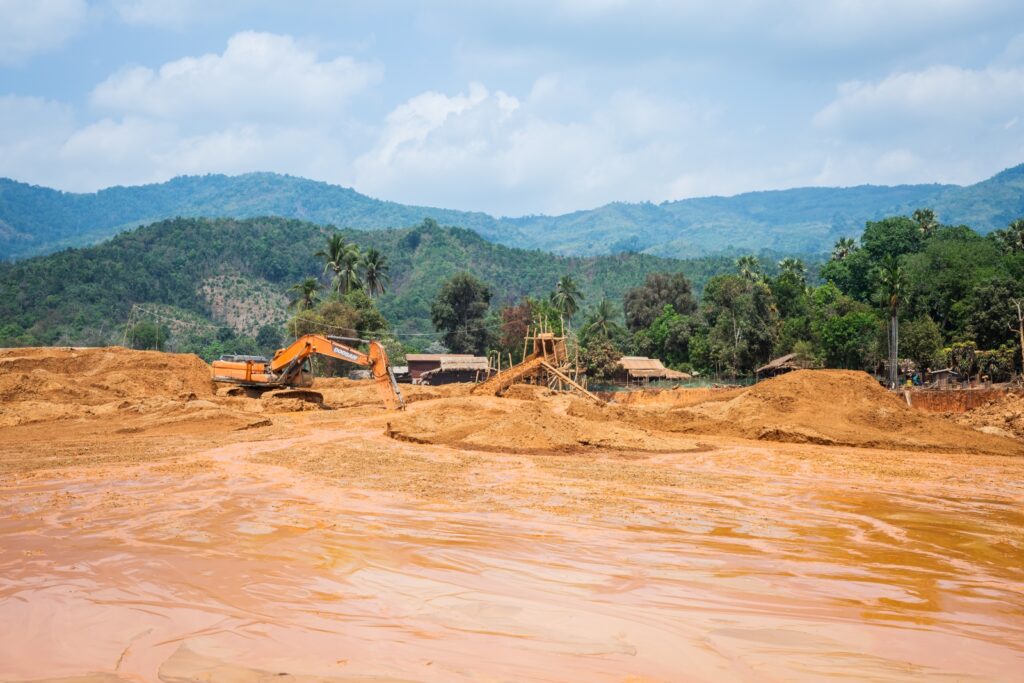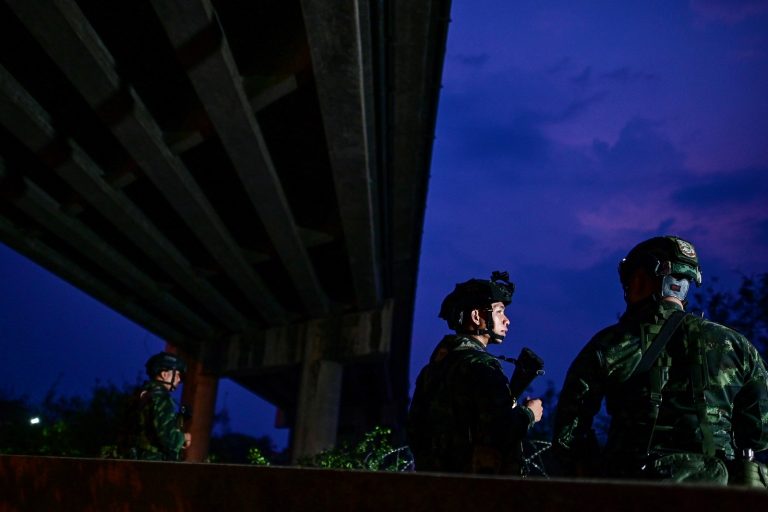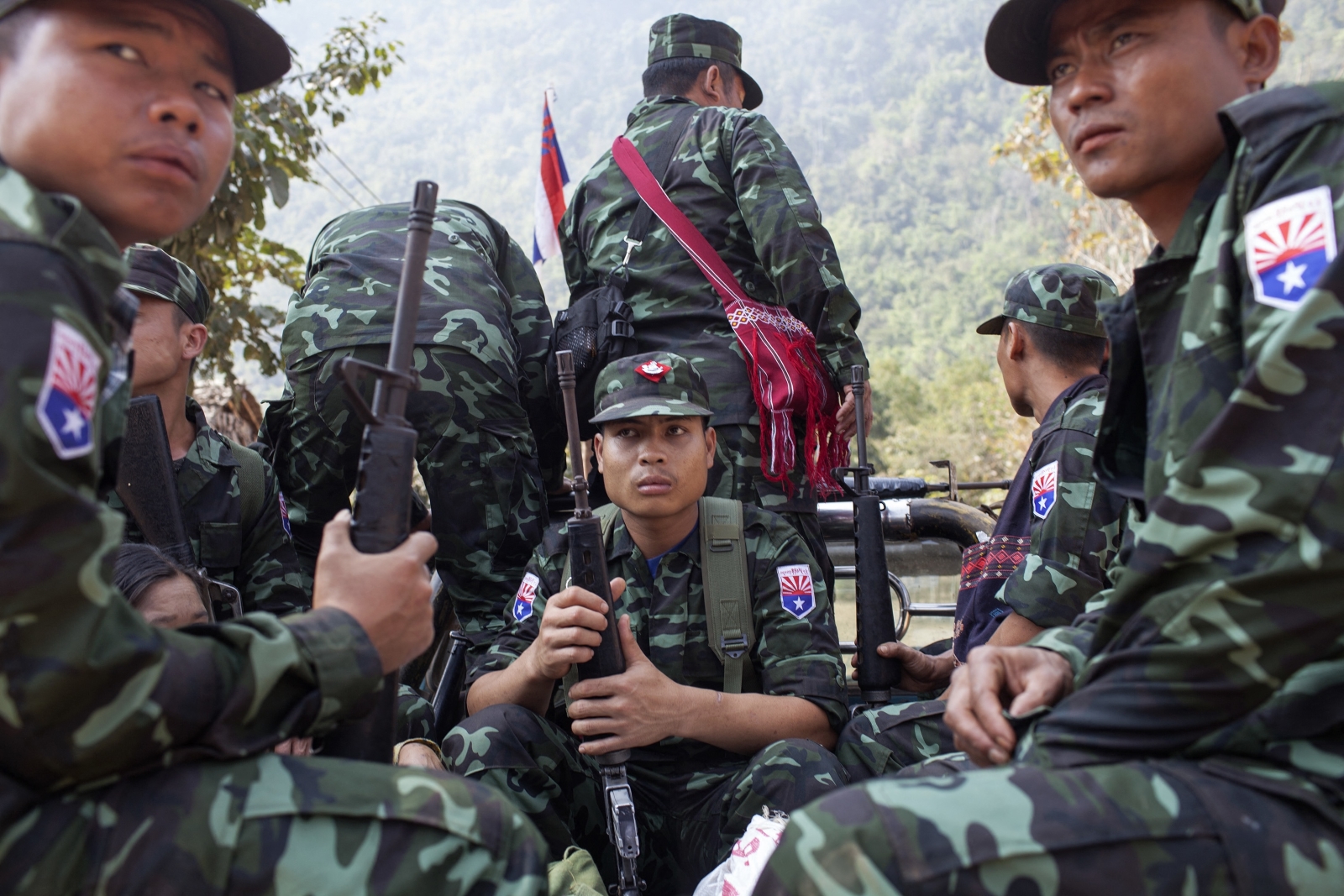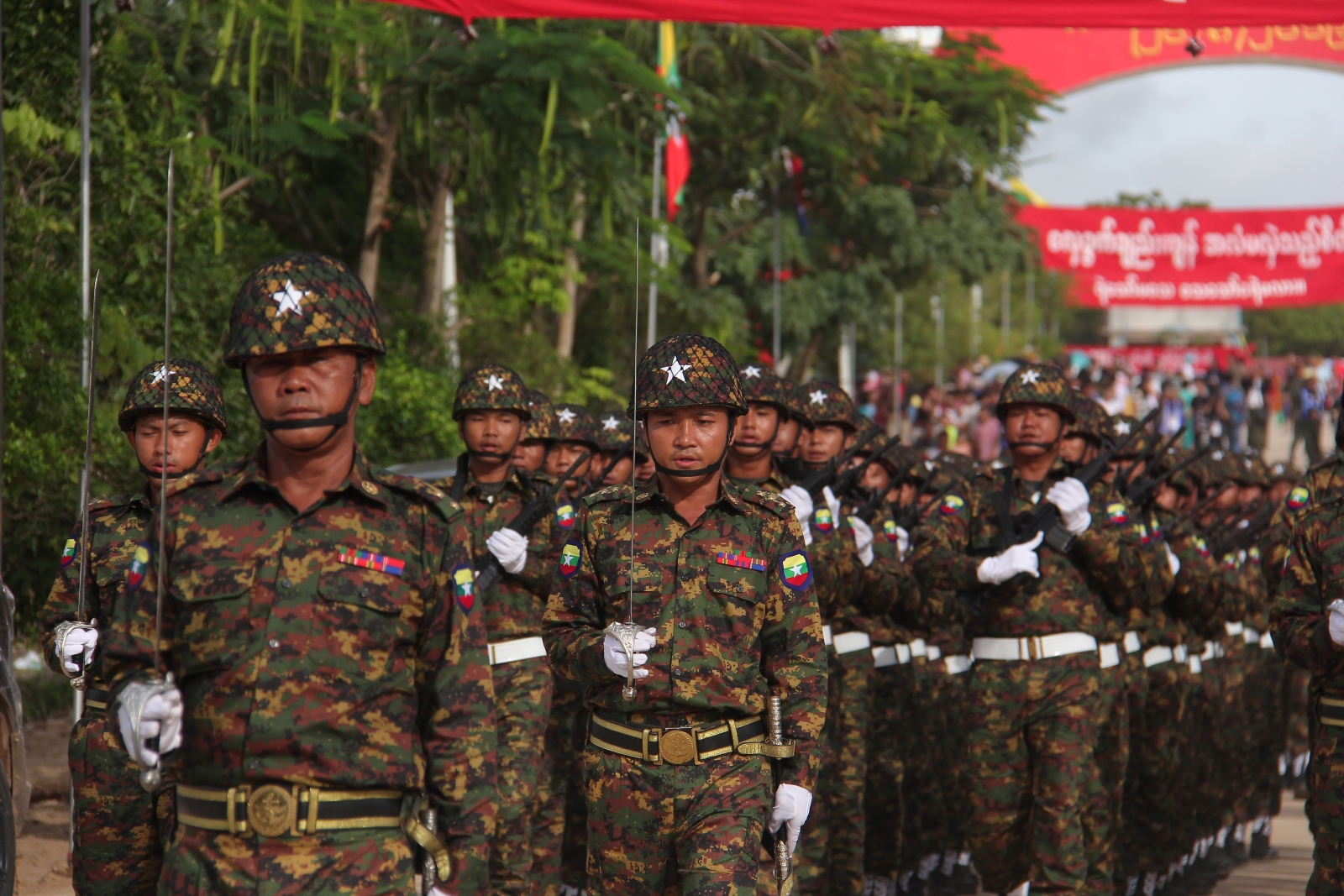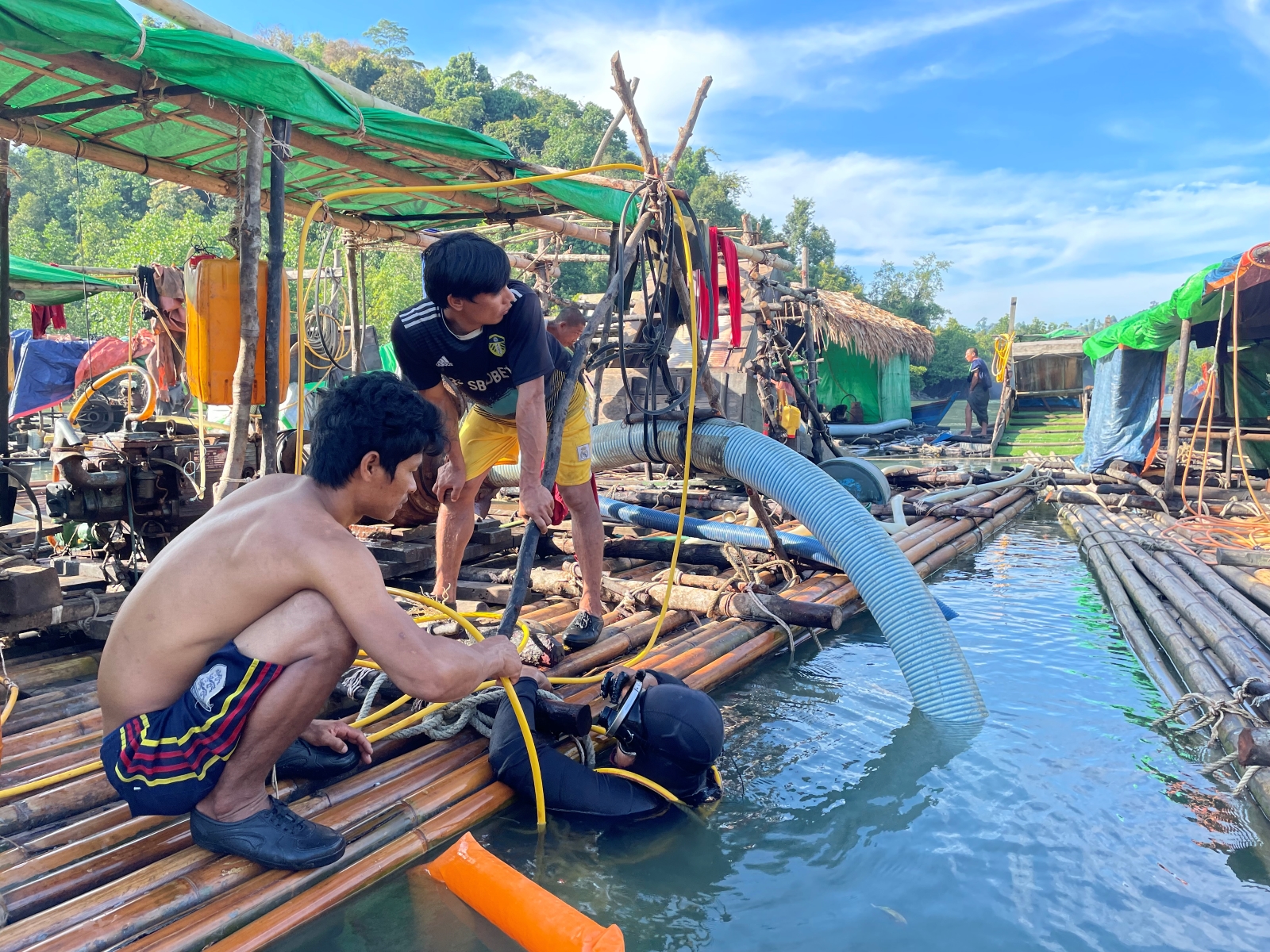Poorly regulated gold mining has turned a life-giving river in Mon State into a toxic death-trap, enriching armed groups while devastating local communities.
By FRONTIER
From the top of Melan Mountain, you can see the Bilin River twist its way from Kayin State in the north to the Gulf of Martaban off the Mon State coast.
As its name suggests, life in Mon’s Bilin Township – about 100 kilometres north of the state capital Mawlamyine – has long depended on this river. But now, says resident and U Sein Win, “that river is only a shell of its former self.”
Years of poorly regulated gold mining have proven deeply lucrative for armed groups operating along the river, including the Tatmadaw-aligned Kayin State Border Guard Force and the Karen National Union, which has fought with the military since 1949. But it’s been devastating for everyone else. The Bilin today is full of arsenic and other heavy metals that are killing crops, cattle and local villagers alike.
“The river is no longer drinkable and can’t even be used safely on crops,” Sein Win said.
He abandoned his farm in 2011, after watching water brought from the river poison and destroy his rice crop. Now he sells souvenirs at the entrance to the mountain-top Kyaikhtisaung pagoda, which pilgrims sometimes visit for its centuries-old laterite construction.
“Without the river, we would have to rely on rain [for our crops]. But we could never make a living that way,” he said. “That river has been slowly dying because of selfish businessmen who only look out for their own interests.”
While the problem is long-running, government officials before the 2021 coup were at least working towards restoration and accountability, even if that process was painfully slow. On May 19, 2020, the Mon State government led by the National League for Democracy told residents not to drink water from the Bilin. Later that year a committee investigated contaminants in the river and issued a report to the state parliament urging action.
But since the military overthrew the NLD in February 2021, efforts to improve public and environmental health have vanished.
Dr Min Kyi Win, who served as Mon’s environmental minister until the coup, said the investigative committee in 2020 found dangerously low PH levels, indicating highly acidic water. This is common near mining sites and indicates high concentrations of heavy metals known to cause fatal illnesses.
He said that high levels of arsenic in particular had caused many people consuming the water over an extended period of time to develop squamous cell carcinoma, prostate cancer and lung cancer, among other diseases. He added that chronic diarrhoea has also become common.
Min Kyi Win could not provide specific numbers on PH or arsenic levels, or other details from the committee’s report, which he said remains in the state parliament building.
“I was arrested after the coup and haven’t gone back to those offices since I was released,” Min Kyi Win said. “That information is in the Mon State government offices, and we are not the people in charge of those offices anymore.”
A representative of the junta-appointed Mon State Administration Council told Frontier their office had no records from any such investigation.

Who’s to blame?
Before the coup, only two companies – Tun Hein Hlyan and Myanmar Shwe Pyi Hein Company – were legally licensed to mine for gold in Mon, according to state government records.
It is unclear who owns the former company, but the latter is owned by U Tin Win and Daw Ohn Myint, residents of nearby Kyaikto Township who are known by locals for their wealth and cosy relationship with the military.
But besides these two registered firms, other companies are mining along the Bilin and its tributaries without state or Union-level authorisation, according to local sources. Most have allegedly found ways to funnel their profits back to their BGF and KNU partners while avoiding paying any taxes to the state or compensating local communities. The largest among them, Chit Linn Myaing, is a conglomerate linked to the BGF. Upriver meanwhile in Kayin’s Hpapun Township, which is largely controlled by the KNU’s Brigade 5, residents say companies deal exclusively with the KNU for licenses and taxation.
Ex gold miner Ko Min Min’s* village of Asu Chaung in Bilin Township is near the largest of Mon’s riverside mines. He told Frontier the mine used to be run by the Ye Tun Company, whose director U Ye Tun seems to play both sides. BGF sources told Frontier he’s a close business partner of their leader Saw Chit Thu, while KNU sources said he was authorised by their group to mine for gold in Hpapun Township in 2010.
Min Min said the large mine near his village passed from Ye Tun to Myanmar Shwe Pyi Hein in 2015 and then to the BGF-linked Chit Linn Myaing in 2021. “I know these company names because I used to work for them,” he said.
When Min Min worked at the mine in 2015, he earned K5,500 to sift silt and separate gold from 8am-6pm each day. As in other mines, mercury and cyanide were used to separate gold from other sediments, although these are highly toxic substances for both humans and ecosystems.
“I could only work for a few months because of the damage to my health from being in contact with chemicals all day,” Min Min said. He described permanently damaged lungs and blood-swollen genitals among his symptoms.
If people do get sick, he said, “it’s very difficult for us to go all the way to Bilin [town] to visit the hospital.”
He said some people in his village still go to work for these companies when they advertise for part-time workers, but that this is starting to change as awareness of the dangers increase.
A local Chit Linn Myaing employee, who refused to give his name for security reasons, said that while the company has been licensed in Kayin for many years, it is operating downriver in Mon without state approval.
As a legal workaround, the employee said, the companies encourage individuals and small groups of people to mine independently. If the outfit is small enough, taxes and authorisation requirements are waived, even if it uses toxic chemicals. The companies then agree to buy all the gold these small miners find but at a discounted price. Combined with the avoidance of tax, this makes the operation an extremely low-cost investment.
“The company has had a mining licence in Kayin State for a long time, and those working for them on the Mon side are doing so with a tacit understanding that this is how it’s done,” the Chit Linn Myaing employee said.
Representatives from the company refused to answer questions from Frontier.

The damage done
In 2009, the Mya Htay Kwal and Chit Linn Myaing companies excavated two large mines in Hpapun without authorisation from the KNU but under the sworn protection of the BGF.
Conflict broke out when the KNU objected, and in 2010 it authorised Ye Tun and the Kocho Company to mine there instead. Although fighting often hampered operations and squeezed profits, the mining largely continued in one form or another.
“Ye Tun is still there, but Kocho stopped in 2018,” a former resident told Frontier, asking not to be named. “Now there are many small operators, and they have to pay taxes to the KNU.”
The resident said he himself was once interested in mining for gold in the area, but when he inquired, a KNU official told him he’d be taxed K20 million (US$6,000 at the market rate) per month for a large mine and K5 million per month for a small one.
“These gold mines alone create all the income the KNU could need,” he said.
But downstream, communities suffer, and they could find little redress even before the coup.
Min Min said villagers lodged complaints and requests with government officials in 2015, 2017 and 2019, and received “absolutely no help.”
Back then, when the river would flood, the poisoned water would destroy farms and make villagers and cattle sick, he said.
“Once, I think in 2012, the water level rose and entered our village wells, and nearly the entire village had diarrhoea — really, really bad diarrhoea.”
“Previously, no one believed they could die from river water. Now we are aware of these new diseases,” he said. “Cancers that were previously unheard of here have begun popping up – my neighbour died last year of prostate cancer.”
“Now we treat the river like poison, avoiding it completely.”
*indicates the use of a pseudonym for security reasons


